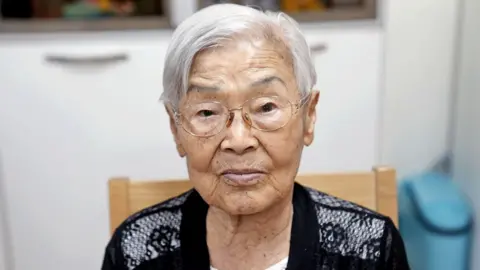The BBC has recently reported on the heartbreaking experiences of Korean atomic bomb survivors who lived through the horror of the Hiroshima bombing. The article primarily focuses on individuals like Lee Jung-soon, an 88-year-old survivor who vividly recalls the traumatic day of August 6, 1945. While on her way to elementary school, she describes the moment her father urged her family to evacuate, just before the bomb exploded. The devastation that followed was horrific; she describes street scenes filled with the dead, victims whose bodies were so mangled that they appeared almost unrecognizable. As she recounts her memories, Lee emphasizes the terrifying nature of such a weapon, which led to immense suffering.
The aftermath of the bombings resulted in immediate fatalities of around 70,000 people, with countless others succumbing to injuries and radiation sickness in the months that followed. Though the destruction caused by these bombings is widely documented, what remains less recognized is the complex narrative of the Korean victims, who constituted about 20% of those impacted. At the time, Korea was under Japanese colonial rule, with many Koreans coerced into moving to Hiroshima for labor purposes, often under grim circumstances.
Survivors like Lee and others have had to live with the generational trauma of disfigurement, pain, and a persistent struggle for recognition and justice. As Shim Jin-tae, another survivor, put it, no party has taken responsibility for the suffering they endured. The United States remains silent, and Japan ostensibly forgets. Even their home country of Korea seems abdicating responsibility, pushing the blame elsewhere, leaving the survivors feeling isolated.
Today, many survivors reside in Hapcheon, South Korea—an area now dubbed “Korea’s Hiroshima,” due to the number of atomic bomb survivors who settled there. Here, they continue to deal with serious health issues that many believe stem from radiation exposure. Lee, for instance, battles skin cancer and other conditions, representing not only herself but also the struggles of her son, Ho-chang, who has kidney failure and requires dialysis. The generational impact is profound; Ho-chang believes his health challenges may also be linked to their family’s past experiences with radiation, although the lack of definitive proof complicates their pleas for recognition.
The article highlights the Korean government’s response—or lack thereof—to these survivors. The Ministry of Health and Welfare (MOHW) in South Korea has been gathering genetic data to better understand the health ramifications but acknowledges that genuine acknowledgment for second- and third-generation survivors remains contingent on future research findings.
Hapcheon’s historical context adds layers to the narrative. Many Koreans were subjected to forced labor in Japan during World War II, often relegated to the most dangerous jobs, which led to high mortality rates among Korean workers post-bombing. Nevertheless, the survivors returned to an unwelcoming home, facing prejudice and discrimination in their native land, where they were often viewed as cursed or disfigured.
As second-generation survivors like Han Jeong-sun reveal, the trauma extends into future generations, not just limited to physical ailments but also entangled with social stigma. Her struggles highlight how the impact of such events permeates familial and societal structures, as individuals continue to be ostracized even by their families.
Interestingly, recent visits from Japanese officials, although a step toward reconciliation, have been criticized for lacking any formal apology or recognition of how Koreans were treated during the war. Activists like Junko Ichiba assert that without acknowledgment, peace initiatives hold little substance.
Through this exploration, it is evident that the legacy of Hiroshima’s bombing reverberates not only within historical contexts but in the everyday realities of survivors and their descendants. The struggles for acknowledgment and justice continue, underscoring the importance of memory and storytelling in ensuring such atrocities are neither forgotten nor repeated. Survivors like Shim Jin-tae stress the need for recognition over mere compensation, capturing the collective desire for their suffering to be acknowledged, understood, and remembered.












